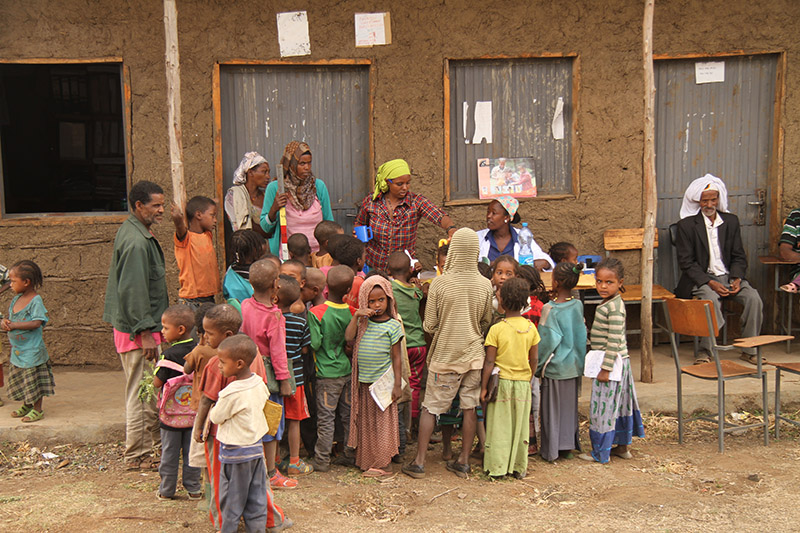Population growth
Global challenge

Africa is home to more than 800 million people under the age of 25. They account for 62 % of the total population. In Asia and Latin America, the same age group makes up just slightly more than 40 % of the population. In the industrialised countries of Europe and North America, the share is only around 25 %.
One of the reasons for Africa’s abundance of children is simple. Traditionally, offspring are regarded as a sign of prosperity as well as a gift of nature that must not be rejected for fear of invoking ancestral wrath. There is a gradual trend in the cities towards smaller families, but in rural areas especially, change is very slow.
Across Africa, women today have an average of four to five children. In some countries, such as Niger, the figure is as high as seven. The counterbalance is in the North African countries and South Africa, where two children per woman have become the norm. The main reasons are higher levels of female education, more women in employment and easier access to contraceptives.
Another reason for Africa’s large youth population is the fall in infant and child mortality, and better care during pregnancy, moreover, has resulted in less risky births. Improvements in health care, moreover, have generally increased life expectancy. So, compared with the first half of the 20th century, for instance, more children are being born in better health and they live longer.
Africa is growing
When the countries of Africa started to gain independence in the 1950s, the continent had a population of around 280 million. That was seven percent of the world population. In the next 60 years, the absolute number rose by more than a billion. Today, there are 1.3 billion people in Africa, accounting for 14 % of the world population. Their numbers are still rising. According to the 2019 revision of the UN World Population Prospects, the population of sub-Saharan Africa will increase by more than a billion people by the middle of this century and will continue to grow beyond the year 2100 in contrast to population figures in the other regions. They are forecast to peak before the end of the 21th century.
The question for African countries is what impact demographic change will have on their medium and long-term development. In the past two decades, vigorous economic growth averaged about five percent. That trend has led to the belief that economies will keep gaining strength through to 2030. The problem, however, is that, with population growth at 2.5 % a year since the end of the colonial era, the economic performance has been too modest to really shift African economies into a higher gear. At the same time, governments need the increased revenues that high growth makes possible in order to rise to the social challenges population growth presents.
More people, especially more young people, mean fast growing demand for education, good jobs and homes. Many countries cannot meet that demand on their own. Therefore, many African governments simply rely on the private sector meeting the majority of people’s needs. In both the health and education sectors, for example, extensive privatisation is common.
Every year, many young people enter the labour market, but fail to find a decent job. There simply is not enough public and private investment. Nonetheless, African governments continue to draw up development plans that count on the demographic dividend (see box) to propel their economies forward. Whether that dividend will materialise, however, is questionable.
At present, there are far too few decently paid jobs. Many young people only make precariously little money in the informal sector. To tackle rampant youth unemployment and underemployment, African governments would need to create 450 million jobs over the next 20 years. But because their economies still depend on commodity exports at prices beyond their control, even very good economic growth will not enable them to create more than 100 million jobs by 2050 according to the Africa Competiveness Report 2017.
Only one in four couples use contraception
Economists who believe in the demographic dividend also assume that population growth will change due to social progress, which includes better education of girls. However, the pace of that change is significantly slowed by cultural factors, and the strong influence of monotheistic religions that reject contraception. Advocates of a stricter family policy, with governments promoting birth control, call for a “contraceptive revolution”. They argue that it is high time for state agencies to intervene. In their view, governments could get three quarters of all African couples to use modern contraceptives. So far, only around a quarter do so.
Without major structural changes in the international economic system and the governance of African countries, Africa’s population growth does not bode well. Its impacts are also a matter of concern for the rest of the world – especially neighbouring Europe and the Middle East.
African youth are a time bomb for governments across the continent. Political and economic power tends to be concentrated in the hands of small minorities, and that drives many unemployed young people to rebel. The Arab Spring and the present protest movements in all parts of Africa must be read as signs of widespread instability. The continent must address this problem in the coming decades.
Protest movements are typically suppressed because those in power fear the loss of privileges. All too often, freedom of expression is restricted because political leaders do not want corruption and nepotism to become exposed. Western and Asian multinationals are facilitating corruption and nepotism. They are not creating enough employment, however. Corporate interests are fuelling fears of neo-colonisation among Africans. Some respond with armed insurrection and terrorism.
Another phenomenon deserves attention. It is the mass exodus of young people from Africa. The desire to find decent work turns them into migrants. Ageing populations in the west and demand for cheap labour in the east tempt more and more young Africans to risk their lives on perilous journeys. For these reasons, Africa’s demographic development is clearly of global, and not merely African relevance.
Links
UN, 2019: World Population Prospects 2019 – Highlights:
https://population.un.org/wpp/Publications/Files/WPP2019_Highlights.pdf
African Development Bank, World Economic Forum and World Bank Group, 2017: The Africa Competiveness Report 2017.
http://www3.weforum.org/docs/WEF_ACR_2017.pdf
Samir Abi works for Visions Solidaires, a non-governmental development organisation in Togo.
samirvstg@gmail.com












